CRIME BOOK OF THE MONTH:
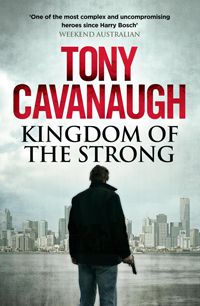
Kingdom of the Strong by Tony Cavanaugh
Darian Richards is a lost man. A man he has hunted for years has vanished again, presumably overseas. His lover is gone. The Noosa River, the one bank of water that affords him peace, is not doing its job. Early retirement is looking like it is not for him. But then: a visitor to the cabin he has retreated to. Victorian Police Commissioner Copeland Walsh – nicknamed Copland for his dedication – asking for his help. He needs to retire, and be replaced. But his replacement, Nick Racine, has a cloud over his past, involving an unresolved death of an 18-year-old woman in 1990. The case needs closing, and Richards, no longer part of Melbourne’s police politics, is the one for the job. Of course, Darian says yes, as he always will to Copland, the man who made Darian into the police officer he is today – decent and dedicated to justice beyond everything else – he always will. And after summoning Queensland Senior Constable Maria Chastain and unstoppable tech whiz Isosceles, Darian will find out what happened to Isobel Vine: for the outgoing and incoming commissioners; for Isobel’s father, still fighting every day to prove his daughter did not kill herself; and for his own sanity.
Cavanaugh’s writing is tight as a clenched fist, and this book is late-night tension, knife-edge danger, pulsating anxiety in your fingers when you turn the page. For every moment that slips out of realism – when Darian’s best friend and Maria’s lover, the slightly criminal yet perpetually honest Casey Lack stumbles around on the page, or when Isosceles manipulates the internet so effortlessly – you are more than paid back in Darian’s dogged pursuit of Isobel’s last few hours, spent in the company of far too many bad people.
Often, when I read crime novels, I’m repulsed and horrified and appalled, frequently swimming through a mire of emotions about the bad things people do. Sometimes, there is enough distance between a victim and a reader that when someone in the pages cracks a joke, I can laugh at it. But I can’t remember the last time I cried in a crime book – and I cried in this, for Isobel. I was horrified, too, of course. The world is not always a lovely place. This fictional world, though, is almost a tangible one. Melbourne is a vivid map in this book, but not the kind you’d pass to tourists: everywhere Darian travels, he remembers which crimes he was solving there, the streets of Melbourne hiding a bloodthirsty history. Lygon Street gets a mention, but don’t expect to be flattered by it. Kingdom of the Strong is devastating; gather your strength and read it.
NEW CRIME
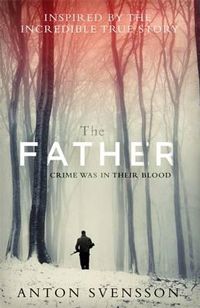
Made in Sweden Part I: The Father by Anton Svensson
They were called The Military League – bank robbers who swept through Sweden, thieving and revelling in it: a father and his sons, a team despite the father’s violent past. This book is a fictional account of a true story of a true spate of armed robberies, and – hold on to your hats – Anton Svensson is a pseudonym for authors Anton Roslund and Stefan Thunberg, the latter supplying the inside knowledge one can only have by being something quite special: a brother, son and friend to the criminals. So how does a splintered family unit come together again to plan something as complicated as a heist? What kind of family breeds this type of thief? Come for the plot, stay for the writing – and brace for the sequel. (And the upcoming movie!)
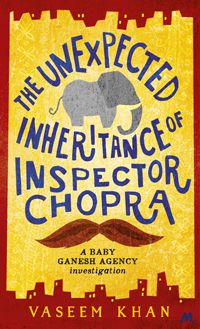
The Unexpected Inheritance of Inspector Chopra by Vaseem Khan
I picked up this brightly-coloured, moustachioed book and thought I’d just have a little flick through and see what it was like. But then I thought I’d just read a bit more. Then suddenly I was halfway through, with seemingly no time passing at all, but who could put down a book about a police officer that retires on the same day he inherits an elephant – the very same day a crime occurs that his replacement is not taking seriously. Even though Ashwin Chopra has been forcibly retired due to his health, he will not let a little heart problem – or even the literal elephant in the room – stop him from doing his best to assist everyone in the Mumbai he adores.
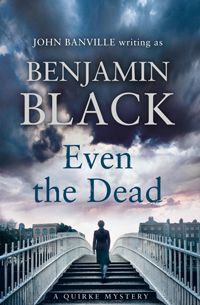
Even the Dead: A Quirke Mystery by Benjamin Black (John Banville)
About once a year I write ‘Booker Prize-winning author’ on this list – and it should be more, of course – and it’s that time again: John Banville is back with his seventh Quirke novel. A vivid and typically taut book from a man as beautifully efficient with words as he is with plot, this follows Quirke, pathologist in 1950s Dublin, as he tries to avoid the any doctor’s orders for peace and quiet (is there a support group for doctors upset at being ignored by overly heroic crime protagonists?) and follows up on a reported suicide that does not convince Quirke at all. And the series of events that follows leads Quirke to a brutal realisation that a conniving political world may have a more personal connection than he ever knew.
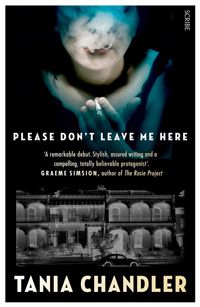
Please Don’t Leave Me Here by Tania Chandler
Early one morning in 1994, Brigitte is the victim of a hit-and-run accident in Melbourne’s east. It’s a surprise to everyone that she’s there that early in the first place – and that there’s a man beaten to death in her Carlton apartment. (Readings books on her bookshelves, let’s hope.) The car accident has wiped all memory of what happened on that morning, and, fourteen years later, she’s married to the detective who helped with her case, living a happy life with him and their twins, when the case is reopened and her life shatters. Did she really lose her memory? Can people really change? An excellent release from a new local author.
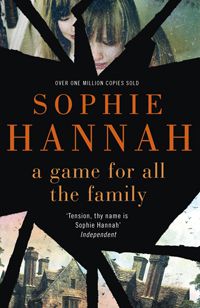
A Game for All the Family by Sophie Hannah
Ah, Sophie Hannah. She loves a twist, a tale that will leave you desperately, happily confused, with more questions than answers. Expect all her books to be compared to Gone Girl, as if no one had written a twist before (the admittedly excellent) Gillian Flynn. In A Game For All The Family, the titular family are the Merrisons: Justine, Alex, and Ellen, an ex-TV executive, opera singer and pouty teenager respectively. They are moving to Devon from London so Justine can recharge and do absolutely nothing for a living, but of course, things go deliciously awry. Unnerving telephone calls, an assignment Ellen is working on that shocks her mother, an ugly old house that enthrals Justine on their first trip to Devon, a boy who may or may have not been expelled from Ellen’s school, or who may not exist at all – who knows what is the truth and what isn’t?
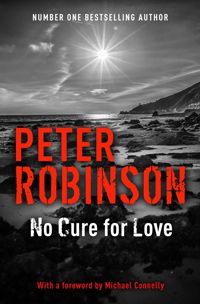
No Cure for Love by Peter Robinson
Not exactly a new Peter Robinson, but new to Australia, No Cure for Love was released 20 years ago and has only just arrived on our shores – but, of course, it’s worth the wait, and in our era of social media threats, people sending alarming letters to celebrities is, of course, as relevant as ever. A standalone thriller with Threat Management Unit detective Arvo (presumably short for Afternoon?) Hughes as its hero, this follows the growing fears of cop-show actress Sarah Broughton, who is being sent threatening letters – and who one day finds a dead body on the beach in front of her house. Sarah claims no knowledge of the stalker, but Hughes thinks there’s more to her past than she’s letting on.
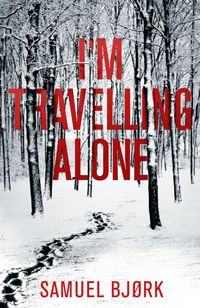
I’m Travelling Alone by Samuel Bjork
Put your thermals on for this atmospheric Scandinavian thriller, because the premise alone will chill your heart: police investigator Holger Munch is tasked with reassembling his homicide team, to track down the person who strung a six-year-old girl from a tree, with the only clue an airport tag around her neck that reads: ‘I’m travelling alone’. Munch’s team is fractured after a bloodthirsty event involving his ex-colleague Mia Kruger, who is, as Munch contacts her, planning her exit from this life; only the case itself brings her back from the edge, just one last time. And Mia does find something: a delicate number 1 etched on the girl’s fingernail. Which means, of course, there will be a number 2.
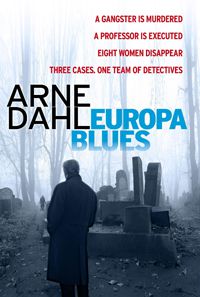
Europa Blues by Arne Dahl
Stylish, addictive, and laced with humour, Arne Dahl’s Intercrime series continues to shine. Paul Hjelm and Kerstin Holm are part of the team that deals with violent international crime in Sweden. In Europa Blues, this involves the death of a Greek gangster at the hands (or paws, as it were) of the animals at the Skansen Zoo, the disappearance of eight women at a refugee centre, and the execution of a professor at a Jewish cemetery. In their search for justice for these crimes, they must scour Europe for the culprits and, ultimately, for the truth.


